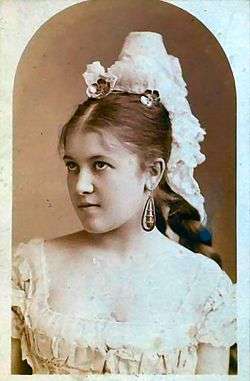Jennie Lee (dancer)
Virginia Lee Hicks (October 23, 1928 – March 24, 1990), better known under her stage name, Jennie Lee, was an American stripper, burlesque entertainer, pin-up model, and a minor role movie actress, who performed several striptease acts in nightclubs during the 1950s and 1960s.
Biography
Lee's act centered on how fast she could get her pastie propellers to spin and how dizzy she could make the audience. Due to her figure (42D"–26"–37), she became known as "The Bazoom Girl" and "The Burlesque Version of Jayne Mansfield". and eventually "Miss 44 and Plenty More". By the early fifties she broke into acting with minor roles in Peek-A-Boo (1953), Abandon (1958), Cold Wind in August (1961), and 3 Nuts in Search of a Bolt (1964) with Mamie Van Doren. Despite her ambitions of mainstream stardom, she found herself typecast in side roles, and never got her acting career off the ground.
In 1955, she helped start a union for dancers, The Exotic Dancers' League of North America (or EDL), acting as the club's first president. During this time in Los Angeles dancers' pay rates were extremely low and the EDL helped fight these matters as wells improved working conditions. Lee's own salary was extremely low as well, and she was forced to live in run-down studio apartments. The dancer tried to keep this from her friends, claiming in a 1980s interview: "They would've thought I was a hooker for sure." During her career Lee appeared on the cover of several magazines, including: Stare in 1954; Risk in 1957; Frolic in 1958, among many others. She wrote an article on herself for a 1955 spread in Modern Man. Besides her life as a stripper, Lee was a noted pin-up girl throughout her career, but like most of her contemporaries, never posed nude, though in later years she did. She also wrote a monthly column on the burlesque and nightclub scene for several years that appeared in a variety of magazines.
Jennifer Lee
Jennifer Lee, Jenny Lee or Jennie Lee may refer to:
See also

Jennie Lee, Baroness Lee of Asheridge
Janet Lee, Baroness Lee of Asheridge, PC (3 November 1904 – 16 November 1988), known as Jennie Lee, was a Scottish socialist politician. She played a lead role in the foundation of the Open University working directly with Harold Wilson to established the principle of open access: Enrolment as a student of the University should be open to everyone … irrespective of educational qualifications, and no formal entrance requirement should be imposed.
Early life
Born in Lochgelly, in Fife, Scotland, to James Lee, a miner (who later gave up work in the mines to run a hotel), and Euphemia Grieg, she inherited her father's socialist inclinations, and like him joined the Independent Labour Party (ILP). Her grandfather Michael Lee (born in 1850 to Irish Catholic parents, and a friend of Keir Hardie) had founded the Fifeshire ILP federation. She later joined the Labour Party, and served as an MP from 1929 to 1931 and from 1945 to 1970.
First term as MP
Lee was educated at Beath High School, she wanted to go to university but her parents were unable to afford the fees. Eventually she went to study law and education with support from the Carnegie Trust who agreed to pay half her fees, at the University of Edinburgh.

Jennie Lee (stage actress)
Jennie Lee (c. 1854 – 3 May 1930), was an Victorian Era English stage actress, singer and dancer whose career was largely entwined with the title role in Jo, a melodrama her husband, John Pringle Burnett, wove around a relatively minor character from the Charles Dickens novel, Bleak House. She made her stage debut in London at an early age and found success in New York and San Francisco not long afterwards. Lee may have first starred in Jo around 1874 during her tenure at San Francisco's California Theatre, but her real success came with the play's London debut on 22 February 1876 at the Globe Theatre in Newcastle Street. Jo ran for many months at the Globe and other London venues before embarking for several seasons on tours of the British Isles, a return to North America, tours of Australia and New Zealand and later revivals in Britain. Reduced circumstances over her final years forced Lee to seek assistance from an actor's pension fund subsidized in part by proceeds from Royal Command Performances.
Podcasts:

